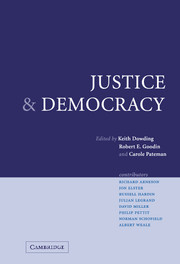Book contents
- Frontmatter
- Contents
- List of figures
- List of contributors
- 1 Introduction: between justice and democracy
- 2 Are democratic and just institutions the same?
- 3 Democracy is not intrinsically just
- 4 ‘The probability of a fit choice’: American political history and voting theory
- 5 Contractarian theory, deliberative democracy and general agreement
- 6 Democracy, justice and impartiality
- 7 Mimicking impartiality
- 8 Justice, democracy and public goods
- 9 The common good
- 10 Individual choice and social exclusion
- 11 Subnational groups and globalization
- References
- Brian Barry's publications
- Index
3 - Democracy is not intrinsically just
Published online by Cambridge University Press: 22 September 2009
- Frontmatter
- Contents
- List of figures
- List of contributors
- 1 Introduction: between justice and democracy
- 2 Are democratic and just institutions the same?
- 3 Democracy is not intrinsically just
- 4 ‘The probability of a fit choice’: American political history and voting theory
- 5 Contractarian theory, deliberative democracy and general agreement
- 6 Democracy, justice and impartiality
- 7 Mimicking impartiality
- 8 Justice, democracy and public goods
- 9 The common good
- 10 Individual choice and social exclusion
- 11 Subnational groups and globalization
- References
- Brian Barry's publications
- Index
Summary
In Bertolt Brecht's glorious Communist propaganda play The Caucasian Chalk Circle, a character who is a mouthpiece for the author declares that ‘things belong to people who are good for them’. In other words, you are entitled to ownership of some item only if your exercise of ownership promotes the common good. This should be understood to be a maximizing doctrine. If one person's ownership of land prevents another person from using the land more productively, the first is wasting resources. At this point in the play what is at issue is rights to use land, but later the same point is applied to politics. The wily judge Azdak displays Solomonic wisdom and demonstrates that it is a grave misfortune for the country that his political rule is coming to an end. Political power rightfully belongs to those people who are good for it.
I am an egalitarian liberal and a democrat, not a communist, but I accept the principle of political legitimacy that Brecht espouses. Systems of governance should be assessed by their consequences; any individual has a moral right to exercise political power just to the extent that the granting of this right is productive of best consequences overall. No one has an ascriptive right to a share of political power. Assigning political power to an hereditary aristocracy on the ground that the nobles deserve power by birth is wrong, but so too it is wrong to hold that each member of a modern society just by being born has a right to an equal say in political power and influence, to equal rights of political citizenship and democratic political institutions.
- Type
- Chapter
- Information
- Justice and DemocracyEssays for Brian Barry, pp. 40 - 58Publisher: Cambridge University PressPrint publication year: 2004
- 69
- Cited by

